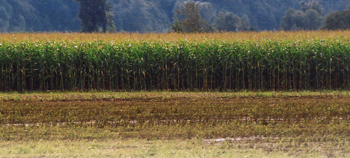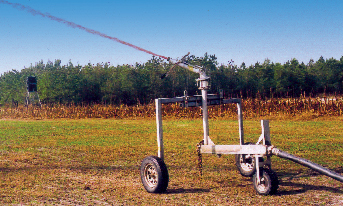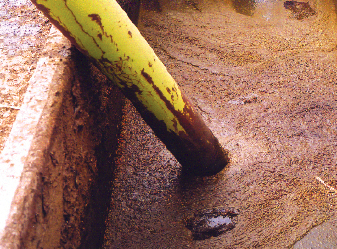
Although there is no single “silver bullet” measure to avoid nuisance lawsuits, livestock operations can still take a number of actions to protect themselves.

|
Although there is no single
“silver bullet” measure to avoid nuisance lawsuits, livestock
operations can still take a number of actions to protect themselves.
In previous issues of Manure Manager, we’ve looked at how courts determine if a livestock operation is causing a nuisance and if so, what damages the operation may be required to pay or what actions the operation may be required to take as part of the court’s order. In this article, we will cover what protections are available to producers to help protect themselves from nuisance liability.
The first step in protecting yourself against nuisance liability is to understand how courts determine if an operation is a nuisance, and the potential liability if an operation is ruled to be a nuisance.
We need to look at options available to producers to protect against nuisance liability, including legal protections as well as operation management and neighbor relations. We previously looked at management practices producers should consider to protect against nuisance liability. Because avoiding a nuisance dispute and lawsuit should be the goal of all producers, we’ll review those practices.
Communication and mediation
Before a nuisance lawsuit can be filed against an agricultural operation in some states, such as Iowa, the party intending to file the lawsuit must first offer the producer the opportunity to mediate the dispute. Whether required or voluntary, producers should utilize mediation whenever possible.
More importantly, producers should contact their neighbors as soon as possible to try and avoid disputes. Communication of the relevant facts by the producer helps avoid unfounded perceptions by neighbors which can escalate into a dispute. While this approach may not always be successful, it helps establish a line of communication for possible resolution later on if a dispute does develop.
Nuisance insurance
Policies or riders to policies that provide coverage for nuisance and other agricultural environmental claims are now available. Insurance policies are contracts, and coverage for any type of liability, including nuisance, depends on the terms of the individual policy. For that reason, livestock producers interested in coverage for nuisance liability must review their policy. In general, because nuisance actions against livestock operations almost always involve odor, liability insurance protection for the livestock operator from general farm liability policies is usually not available because of exclusions in the policy, including the “pollution exclusion.”
 The most effective method of protecting against nuisance lawsuits is to implement manure management practices that minimize the impact of an operation on neighbors. The most effective method of protecting against nuisance lawsuits is to implement manure management practices that minimize the impact of an operation on neighbors. |
However, there are several examples in recent years where a general farm liability policy (without special nuisance coverage) was found to provide coverage for a livestock nuisance lawsuit. In October of 2005, an Iowa district court judge ruled that a policy’s pollution exclusion did not prohibit coverage in a livestock odor nuisance case because the policy did not expressly include odor in the definition of pollutants. However, a district court judge in another Iowa county previously ruled that the same definition of pollutant did include odor and therefore excluded coverage for an odor nuisance suit.
The bottom line is that producers who are constructing or expanding an operation should check with their insurance agent and other advisors as soon as possible to determine if they have or can get coverage for a nuisance lawsuit. If a neighbor objects to an existing operation, a producer should also check to see if they have coverage. If the answer is no, producers should check with an attorney to determine if the insurance company’s interpretation should be challenged. In addition to determining if there is coverage, a producer must know what is covered. Coverage may include, subject to policy limits, attorney fees and other court-related expenses, as well as any damages a court may award.
Right-to-farm laws (nuisance defenses)
All fifty states have some type of law (some states including Iowa have more than one) that has been enacted to protect farmers from nuisance lawsuits. Unfortunately for Iowa livestock producers, Iowa is the only state where courts have ruled that a right-to-farm law is unconstitutional. Without getting into the legal intricacies of the laws and the court decisions, producers should be aware of the details of their state’s law or laws and how courts have interpreted those laws.
Many nuisance defense laws require a producer to take certain steps, such as implementing Best Management Practices or being in operation for a certain period of time, to qualify for protection under the law. More importantly, with or without the legal protection of state nuisance defense laws, producers must utilize good management practices to minimize liability for nuisance.
Statute of limitations
Statute of limitations is a legal doctrine that prohibits the filing of a lawsuit if the person filing the suit waits too long after the underlying event occurs. Iowa law provides that lawsuits claiming property damage must be filed within five years and claims for personal injury must be filed within two years. The Iowa Supreme Court has ruled that livestock odor nuisances are “permanent nuisances” in a legal sense. This means that once the applicable time period has passed, a lawsuit cannot be filed. The Iowa Supreme Court has not yet ruled whether claims for livestock odor nuisance are subject to a five-year or two-year statute of limitations. However, Iowa district courts have ruled and the rulings have been inconsistent. One district court judge ruled that the statute of limitations for all nuisance claims was five years while another ruled the statute of limitations for claims for loss of property value was five years but two years for claims for personal inconvenience, annoyance and discomfort, physical and emotional pain and suffering, mental distress and fear of illness.
Whatever the period of time, producers must be aware that an expansion of the operation or a significant change in management or other factors in the operation could start a new limitations period. Producers should use good management practices to minimize potential nuisance conditions both before and after the statute of limitations period that applies to their operation.
Contractual arrangements
Courts have ruled that landlords renting out farmland where manure is applied may be liable for nuisance along with the tenant farmer who operated the livestock operation and applied the manure.
In a landlord-tenant case, the Iowa Supreme Court recently ruled that although in general a landowner is not responsible for a nuisance created by a tenant on rented land, landlords where manure was applied from a tenant’s hog operation would be liable for nuisance if they were aware of the nuisance complaints of the neighbors about surface manure application before they rented their land to the tenants and also before annually renewing the verbal crop share lease.
The court noted that when the lease was renewed annually, no limitations on the method of manure application were imposed by the landlords. The court emphasized: “We do not hold that all rural landlords who allow manure spreading on their property are liable for nuisance. We merely find that this landlord’s unique level of involvement with both the lessee and complaining neighbor generate enough factual issues to surmount the obstacles to landlord liability at this stage in the proceedings.”
Courts have also ruled that owners of livestock who contract with farmers to feed the livestock may be liable for nuisance along with the farmer who fed the livestock. As a general rule, livestock owners should not be liable for nuisance unless the owner “knows or has reason to know” a nuisance is “likely.” On the other hand, courts may also look at the level of control the livestock owner has over the operation. In 2004, an Iowa jury ruled that a livestock owner under a contract feeding arrangement was jointly liable for a nuisance at an operation owned and operated by a contract feeder because the livestock owner “substantially participated” in the nuisance via the contract feeding relationship.
Like many other forms of legal liability, responsibility for nuisance liability in these situations can be dealt with in the lease or contract between the parties. Parties to a lease or contract cannot prevent a neighbor from filing suit against all of the parties.
Parties to the lease or contract can only apportion liability between themselves if nuisance damages are ultimately awarded. Parties to a lease or other contract should discuss potential nuisance liability before the agreement is signed and clearly provide in the lease or contract the duties and liability of each party. While some might consider one party shifting nuisance liability to another party by contract to be unfair, as long as both parties are aware of the potential liabilities and understand the terms of the contract, it should be left to the parties to work this out in the contract. The key is that both parties read and fully understand the contract before it is signed. And finally, as with other protections discussed in this article, implementing appropriate management practices to minimize potential nuisance conditions should be the goal of all parties to a lease or contract.
Management practices
The most effective method of protecting against nuisance lawsuits is to implement management practices that minimize the impact of an operation on neighbors. Legal protections and communications with neighbors all depend upon taking steps to minimize odors and other potential nuisance conditions. The following list appeared in the first part of these articles and, because of its importance, bears repeating here.
- Make every attempt to get to know your neighbors. Realistically assess the situation with neighbors before building or expanding an operation.
- Listen to and sincerely respond to neighbor concerns—even if they seem unfounded or beyond the producer’s control at the time. Consider all reasonable suggestions to address the concerns.
- Meet with concerned neighbors to explain your operation. Participate in mediation if requested by neighbors. Never give up trying to resolve the situation.
- Be aware of and comply with—or better yet exceed—all legal requirements for the operation.
- Design and construct the operation to minimize its impact on neighbors. This includes locating as far from neighbors and public areas as possible, designing sites that are not visible to neighbors, and utilizing the latest design technology to minimize odor (for example, tree shelter belts and biofilters). Work with advisors, such as a manure management specialist, attorney, and entomologist, to design and site your operation to minimize impact on neighbors.
- Stay current on new technologies and management practices to minimize odor, flies, etc. Attend meetings and seminars on these topics.
- Use Best Management Practices including keeping facilities as clean as possible, making sure manure storage structures are being operated according to current industry standards, and using products that reduce odor and flies in buildings and manure storage.
- Direct inject, or incorporate manure within a short period of time following application. If manure must be applied and soil conditions will not allow injection or incorporation, contact neighbors beforehand and let them know your dilemma and why you can’t inject or incorporate this time.
- Avoid applying manure near neighbors, if possible. Notify neighbors prior to applying manure and offer to postpone application if neighbors have special activities planned.
- Apply manure when wind, temperature and other weather conditions are less likely to cause odor to reach neighbors.
- Apply manure as few times as possible throughout the year. This is a major advantage for newer confinement operations that have enough storage capacity to allow manure to be applied once each year.
- Avoid manure on roads and, as much as possible, avoid leaving mud, etc on roads. If neighbors live on gravel roads, offer to pay for application of products to keep dust down.
- If more land is needed for manure application, consider offering the manure to neighboring farmers.
- Although many producers are not interested in owning residential property, consider purchasing acreages that are for sale near your operation. The residence can either be rented out or re-sold with a deed restriction establishing a nuisance easement or covenant.
- Require all manure applicators, input suppliers, livestock haulers, etc to follow good neighbor practices. Most are more than willing to pay careful attention to their activities if they know of your neighbors’ individual concerns. Inform employees about good neighbor practices and make sure they follow them.
 Another Anothermethod of protection against nuisance lawsuits is to use Best Management Practices, making sure that manure management storage facilities are being operated according to current industry standards, and using products that reduce odor and flies in manure storage. |
Above all, producers should not feel they are alone in dealing with objections from neighbors and in developing appropriate management practices. Many organizations can provide assistance including groups such as the Coalition to Support Iowa’s Farmers and similar organizations formed in other states specifically to assist livestock producers with community relations. Other groups include state and national agricultural organizations and educational resources such as state university agricultural extension services.
As noted previously in this series, there is no single “silver bullet” to avoiding nuisance lawsuits and producers cannot be certain which steps they take will be successful. What works in one situation may or may not work in another. However, it is clear that producers must avoid thinking that a nuisance lawsuit could never happen to them. Likewise, producers must also avoid thinking that if a dispute arises nothing they do will satisfy the neighbors complaining and therefore there is no use in even trying. Many producers have been successful in avoiding a nuisance lawsuit after neighbors have voiced their opposition, after neighbors have hired legal counsel, and even after the neighbors and their legal counsel have taken initial steps toward filing a lawsuit.
Whether an operation has never had a complaint or if there has been vigorous opposition, producers must take all reasonable steps available to them to try to minimize the impact of their operations on neighbors.